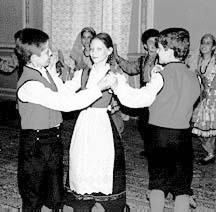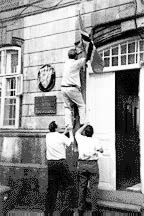|

Autumn 1996 (4.3)
Pages 66-67
Diplomatic Interview
Norwegian
Consulate in Baku
Harald Finnvik
by Betty Blair
With Harald Finnvik, Consul
General for Norway in Baku, who doubles as Resident Manager for
Statoil.
Your situation
here at the Norwegian Consulate is quite unique among the Embassies.
You're both Consul General for Norway and Resident Manager of
Statoil, "wearing two hats"-one as diplomat, the other
as businessman. How do you find this combination works?
When I arrived on the
scene in Baku in June 1995, the Consulate had already been set
up by my predecessor. Back in September 1994 the Norwegian delegation
arrived in Baku to take part in the signing of the "Contract
of the Century" since Statoil was a partner in this project.
It was then that the Azerbaijani government challenged us to
set up diplomatic representation here.
Now Norway is a small country. Many consider us rich. But the
truth is that we're small, and there are limits as to what we
can afford. The Norwegian government felt that to establish an
Embassy here might be a bit premature. That's when they asked
Statoil if their representative could also take on the responsibilities
of the Consulate. Of course, we agreed.
  Left: Azerbaijani children, wearing Norwegian traditional
costumes, performing Norwegian dances on the occasion of Norwegian
Constitution Day, May 17, 1996 in Baku at the Nizami Museum. Left: Azerbaijani children, wearing Norwegian traditional
costumes, performing Norwegian dances on the occasion of Norwegian
Constitution Day, May 17, 1996 in Baku at the Nizami Museum.
Actually, this arrangement
is not unique to Azerbaijan. It's a tradition with us. In the
past, we used to be quite spread out all over the world because
we have a large merchant fleet. We needed official governmental
contacts in numerous harbors so we created consulates and used
Norwegian companies to man them.
What do you
do here as Consul General?
First of all, I act
on behalf of the Norwegian Ambassador Svein Saether who sits
in Ankara. I'm really just a local hand. I get involved if anybody
loses his passport but mostly I act as an emissary between Azerbaijan's
Ministry of Foreign Affairs and the Norwegian authorities. This
gives me the possibility, of course, to expand our business network-a
chance I personally would never have had if I were acting only
as a Statoil representative. Combining two jobs is challenging
but it's also inspiring and I like it.
We've also established an Azerbaijan-Norway Friendship Society
and have invited senior people in the Azerbaijani government
to be honorary members. So with a few resources we are able to
promote the Norwegian industry in Azerbaijan in a very efficient
way.
 
Photo:
Raising the Norwegian Flag
at the Consulate which also serves as the Norway House which
provides administrative infrastructure for Norwegian companies
getting started. In the "Old Inner City" of Baku.
So generally,
you find that the two jobs complement one another?
There are really only
about 20 Norwegians here. Most of us are in the oil business.
So there isn't so much work at the Consulate. In our Embassy
in Turkey, it's quite busy as there are hundreds of Norwegians
and thousands of tourists, and the office has to deal with people
losing their passports and money. Actually, the Consulate takes
less than 5% of my time. My busiest period was when we were preparing
for President Heydar Aliyev's official visit to Norway earlier
this year.
How did the
trip go?
It was an important
event. Norwegians became so much more aware of Azerbaijan. Not
many people there know much about Azerbaijan so this trip acted
as a catalyst to introduce Norwegian industry to the potential
here. I think the Norwegian people are beginning to understand
how important Azerbaijan can be.
On the other hand, it was good for President Aliyev to see our
country, too. Our Prime Minister holds great respect for him,
and I think he felt this support from the Norwegian government.
We showed him Statoil's operations in Stavenger.
President Aliyev always delights in seeing Thor Heyerdahl (See
AI 3:2, 60; Spring 1995. "The Azerbaijan Connection: Challenging
Euro-Centric Theories of Migration") and so we managed to
arrange for Heyerdahl, now 81, to come to Norway and give the
President a personal tour through the Kon Tiki Museum. It was
a unique occasion. Twice Heyerdahl has been to Azerbaijan to
study the petroglyphs of the reed boats in the ancient cave of
Gobustan, located about an hour's journey east of Baku. He's
hoping to be back in 1997 since he is part of the Azerbaijan-Norway
Friendship Society.
So the visit
provided the impetus for further relations.
I think Norway can be
something of a model for how Azerbaijan can develop. There are
so many similarities between our countries. We're both small.
Our histories have both been shaped by the oil industry. I think
seeing how the Norwegian economy has benefited from the revenues
from the oil industry-the way it is controlled, the way it is
run, the way the money benefits the people-could be valuable
for Azerbaijan. Actually, quite a few government officials have
already visited Norway to study this.
Of course, Norway should not be viewed as the only model for
Azerbaijan, there are many others. It doesn't mean that since
we've been successful, Azerbaijan should copy our model. They'll
have to discover what's best for them.
Let's focus
a bit on your business role. What are some of Statoil's newest
developments in Azerbaijan?
Well, I'm the only one
actually representing the Statoil office at present, but we have
12 people who are working with AIOC [Azerbaijan International
Operating Company]. Now that we've recently signed a production-sharing
agreement for the development of Shah Deniz, I'm expecting at
least five additional people to arrive here in the coming months,
and depending upon the progress we make in 1997, more will be
assigned here. We're now involved with asset management in Statoil
which means that we're moving away from headquarters and trying
to place our organizations closer to where the actual work is
going on and where the decisions really should be made. It means
we spend more time doing things and less time reporting about
them.
We are involved with SOCAR with some technological transfer regarding
Subsea installations. Statoil probably has the greatest number
of Subsea installations of any company. It's clearly the wave
of the future. In new fields in the North Sea, we're getting
away from huge concrete structures which are so costly. Now,
we're organizing floating production ships down to a number of
Subsea wells that are spread around the sea bottom. This is the
trend. So now we're doing some joint Subsea studies with SOCAR,
starting with Oil Rocks. Subsea installations were really intended
for deeper waters, but SOCAR would really like to study them
in territory that they're already very familiar with.
What's
happening these days with the Norway House that you're setting
up to facilitate Norwegian companies here?
Last year at the 1995
Caspian Oil & Gas Show, a few of us were talking about how
difficult it is to get started here unless you had a contract
in hand. The little guy has a hard time competing with the big
guy. A lot of companies were reluctant to make the plunge because
it's so hard. Just the everyday routine tasks are difficult to
manage if you're on your own. You really need some sort of facility-a
place to work, a telephone number, a fax number. You need a driver
who can take you to meet the right people. You need a highly
qualified interpreter. All this administrative support is immensely
important when you're in the middle of negotiations. Sure, you
can do all this from your hotel room or apartment but there are
a lot of hurdles. What do you do when you need something as simple
as a letter to be typed or a document copied, for example?
That's when we got the idea that if the Norwegian companies which
wanted representation here would pool their resources, we could
split the costs and share the infrastructure. In Norway, the
State Petroleum Industry has recently made drastic reductions
to their general costs, by cutting back by 50 percent. They're
doing that so they can be competitive in the future. We knew
that if we didn't reduce our costs, investment capital would
go elsewhere in the world, and if it didn't come to the North
Sea, we would all be out of business.
Pulling back 50 percent is an incredible amount. It meant that
we had to rethink and restructure everything. In Baku, one way
to support this effort has been to create the Norway House.
So we're here. And quite a few Norwegian companies are beginning
to take an interest in the Caspian Sea. They're beginning to
come. We see our facility as an initial stepping stone-to get
them started. I expect there will be a continuous flow of new
companies as the ones who have been here longer start signing
contracts. Of course, a few companies will disappear, but most
of them, we hope, will be able to carry on and eventually move
into their own offices and set up their own administrative infrastructure.
What about
your own path to Azerbaijan? What is your own background?
Actually, I've been in the oil business for only the last 15
years. Prior to that I was in computers-programming and sales.
Then at 33, I went back and studied Economics, returning to the
University for three years. I have a Masters in Business Administration,
finishing the School of Economics and Business Administration
in Bergen. I joined Statoil afterwards. I've lived in the US,
Germany and Azerbaijan but have been involved with many international
projects at Statoil in Norway.
I like being in Azerbaijan very much. I find it exciting to be
working in a country that's so new-that's just opening up. Despite
the language barrier, Azerbaijanis are very open and very easy
to communicate with.
Did that
surprise you that Azerbaijanis were so receptive?
Yes. I didn't have any
idea it would be this way. Actually, I didn't know anything about
Azerbaijan before I arrived. Most of the things that I've learned
have surprised me. Azerbaijanis are seeking ways to find their
roots. They're proud of their past, and they're trying to create
a new identity as a young independent nation. In my relations,
I haven't really noticed that they have what I would call "the
Soviet Stamp" on them. Personally, I feel as secure here
as I do in Norway, and I'm convinced there's a great future for
Azerbaijan.
When I first thought about coming here, I had a different attitude.
I thought I would just put in my time, a maximum of three years,
and when it was over, I'd take my paycheck and go back home.
Now I'm not even thinking about returning. Why should I go back?
I'll never have a job like this one. I love the place, I love
the people and I love the job. Of course, Norway is always in
my heart, and it's inevitable that someday I will return, but
I don't even give it a thought right now.
From Azerbaijan
International
(4.3) Autumn 1996.
© Azerbaijan International 1996. All rights reserved.
Back to Index
AI 4.3 (Autumn 1996)
AI Home
| Magazine
Choice
| Topics
| Store
| Contact
us
|


